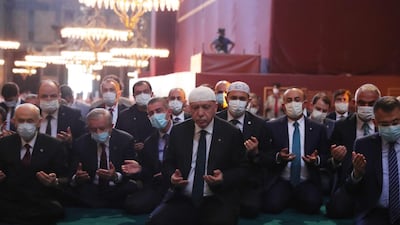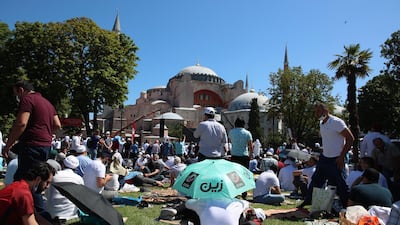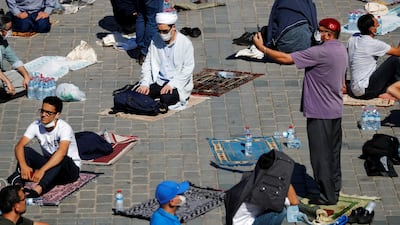Hundreds of Muslims took part in congregational prayers inside Istanbul's Hagia Sophia for the first time in 86 years on Friday, joined by tens of thousands worshipping outside the 1,500-year-old former cathedral.
The Friday prayers were televised around the world in the culmination of a decades-long fight over changing the building from a museum to use as a mosque.
President Recep Tayyip Erdogan was at the fore of 500 dignitaries for the landmark service, kneeling on a 2,000 square metre turquoise-coloured carpet, which the manufacturer boasted consisted of wool fibres pointing towards Makkah.
Mr Erdogan read passages from the Quran during the service, after which he visited the nearby tomb of Ottoman Sultan Mehmet II. “Reverting Hagia Sophia to its original form as a mosque was a dream of my youth,” he said, adding that 350,000 had attended the prayers.
He arrived at midday to cheers and shouts of "The chain has been broken, Hagia Sophia has been opened" from the crowds surrounding the 6th-century Unesco World Heritage site.
Hagia Sophia's famed Byzantine frescoes and mosaics – relics of its 900-year history as a centrepiece of Christianity – were obscured by curtains to comply with Islam's rejection of the representation of the human form.
Worshippers camped out overnight to secure a prayer place in the streets and squares surrounding the newly-designated mosque. Istanbul's governor had warned them to bring just four things to the event, "a mask, a prayer mat, patience and understanding".
"We have turned years of sadness into joy, that's the reason for our happiness," Ali Kemal Evlioglu, who hitchhiked from the Black Sea city of Samsun, told the state-run Anadolu news agency.
Some 21,000 security personnel and 700 health workers were on duty for what Health Minister Fahrettin Koca said would be the largest mass gathering during the coronavirus pandemic. Free buses were laid on to bring people from around Istanbul and beyond.
The Treasury minted commemorative coins to mark the event.
Completed by the Byzantines in 537, Hagia Sophia was for centuries the world's largest building and an engineering marvel. After conquering Istanbul in 1453, Mehmet II made it a place of worship for Muslims.
In 1934, Mustafa Kemal Ataturk's secular regime turned it into a museum, a decree reversed two weeks ago, allowing Mr Erdogan to rename it Hagia Sophia Grand Mosque.
Before last year, the president remained outwardly ambivalent about Hagia Sophia but in the run-up to local elections he outlined his support for its role as a mosque.
The status of the iconic building, which received 3.7 million visitors last year, has served as a rallying cry for Mr Erdogan's conservative and nationalist base and some observers say the president has used the issue to distract voters.
Ismail Kandemir, head of the association that brought the case to revoke the 1934 decision, said he was excited after years of legal wrangling. "I want to see it and live it," he said. "It's an unspeakable feeling."
The case led to foreign officials and church leaders calling on Turkey to back away from reclaiming the building for Islam.
Tugba Tanyeri-Erdemir, a research associate at the University of Pittsburgh and a member of Turkey's Association for the Protection of Cultural Heritage, said the "televised spectacle of conquest will cause further offence to stakeholders around the world who feel hurt by Erdogan's sectarian practice and rhetoric".
She added: "It reinforces their suspicions that Hagia Sophia's conversion is a political manoeuvre showcasing the Turkish president's supremacist foreign policy."
Meanwhile, Omer Saglam, a writer and a former official in Diyanet, Turkey's authority for religious affairs, said conservative justification for returning Hagia Sophia to use as a mosque – that it was decreed so by right of conquest in the 15th century – was disingenuous.
"Hagia Sophia is entirely governed by Turkey's domestic law and its use is at the discretion of political power," he said. "Therefore, there is no need to justify the change with such nonsense as the 'right of the sword' or 'Fatih Sultan Mehmet's will'."





























